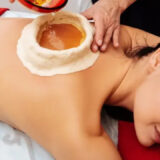Castor Seed Oil for Hair: The Secret to Stronger, Shinier Hair
Castor seed oil is a versatile vegetable oil extracted from the seeds of the Ricinus communis plant, known for its rich composition of ricinoleic acid, essential fatty acids, and antioxidants. This thick, pale yellow oil has been cherished for centuries due to its numerous therapeutic properties. 
Used both internally and externally, castor oil offers a wide range of benefits, particularly for skin, hair, and overall health.It has been traditionally used for promoting hair growth, soothing dry skin, and alleviating joint pain. Additionally, castor oil is often incorporated into beauty routines for its ability to nourish and hydrate the skin.
What Is Castor Oil?
Castor oil is a thick, pale yellow liquid that is derived from the seeds of the castor bean plant. The oil is primarily made up of ricinoleic acid, a monounsaturated fatty acid, which gives it many of its beneficial properties.
In addition to its unique chemical structure, castor oil also contains omega-6 and omega-9 fatty acids, vitamin E, proteins, and other nutrients.
These components contribute to its powerful moisturizing, anti-inflammatory, and antimicrobial properties, making it useful in treating various conditions, from dry skin to hair loss.
Popularity and Usage in Ayurveda for Promoting Hair Health
In Ayurveda, castor oil has been a prominent remedy for improving hair health for thousands of years. According to
Ayurvedic principles, castor oil is considered to balance the body’s doshas, particularly Vata and Pitta, which are believed to play key roles in hair growth and scalp health.
The oil is renowned for its ability to nourish hair follicles, stimulate circulation in the scalp, and promote healthy hair growth.
It is often applied to prevent hair thinning, enhance the strength and shine of the hair, and combat dandruff and dry scalp conditions.
Significance of Ayurvedic Practices in Modern Wellness
Ayurveda, the ancient system of natural healing originating in India, emphasizes the importance of balance in the body, mind, and spirit.
With the growing interest in holistic wellness and natural remedies, Ayurvedic practices have seen a resurgence in modern wellness circles.
The use of natural oils, such as castor oil, for hair and skin care has become more mainstream as people seek alternatives to synthetic products.
Ayurveda’s focus on personalized care and the use of plant-based ingredients for promoting health resonates with today’s demand for sustainable, effective wellness solutions.
Ayurvedic Principles Behind Castor Oil
Doshas (Vata, Pitta, and Kapha) and How Castor Oil Balances Them: In Ayurveda, the body and mind are believed to be governed by three primary energies or doshas: Vata, Pitta, and Kapha.
These doshas represent different elements and qualities in the body and mind. Achieving balance between them is essential for optimal health.
Castor oil, with its unique properties, is known to help balance these doshas in various ways, especially in relation to hair health.
- Vata is associated with the elements of air and ether and is responsible for movement, dryness, and lightness in the body. When Vata is out of balance, it can lead to conditions like dry, brittle hair and a flaky scalp.
- Pitta is linked with the elements of fire and water, governing metabolism, heat, and transformation. Excess Pitta can lead to inflammation, excessive heat, and hair thinning or loss.
- Kapha is connected to the elements of earth and water, bringing stability, moisture, and structure. When Kapha is imbalanced, it can result in excessive oiliness, heaviness, and sluggish circulation in the scalp.
Effects of Castor Oil on the Body According to Ayurveda
- Cooling Effects on Pitta: Castor oil has a cooling quality that helps balance Pitta, which can become aggravated, leading to scalp inflammation, heat, and hair loss. Its soothing properties calm irritation, reduce dandruff, and create a healthier scalp environment, promoting hair growth and reducing shedding.
- Moisturizing Qualities for Vata: Vata imbalances can cause dryness and brittleness in hair. Castor oil’s rich, emollient texture deeply moisturizes, restores elasticity, and prevents breakage. Regular use softens dry hair, reduces split ends, and promotes resilience.
- Nourishing and Strengthening for Kapha: Castor oil helps balance excessive moisture from Kapha, which can lead to oily hair or slow growth. It nourishes and strengthens hair, enhancing thickness, shine, and overall health, while preventing the hair from becoming heavy or limp.
In summary, castor oil supports balanced, healthy hair by addressing the unique needs of each dosha: cooling Pitta, moisturizing Vata, and nourishing Kapha.
Nutritional Composition of Castor Oil
- Ricinoleic Acid: Making up about 90% of castor oil, ricinoleic acid has anti-inflammatory, antimicrobial, and moisturizing properties. It improves circulation to the scalp, stimulates hair growth, and strengthens hair, preventing damage and breakage.
- Omega-9 Fatty Acids: Rich in oleic acid, omega-9 fatty acids deeply hydrate and moisturize the hair and scalp, enhancing the lipid barrier and preventing moisture loss. This helps retain moisture and improves shine, making it ideal for dry or brittle hair.
- Vitamin E: A potent antioxidant, vitamin E protects hair from environmental damage, improves blood circulation to the scalp, and promotes follicle nourishment. It also supports scalp health by preventing dandruff and flakiness.
- Minerals (Magnesium, Zinc, etc.): Castor oil contains magnesium, zinc, and iron, which support hair health by improving circulation, promoting cell regeneration, preventing thinning, and ensuring optimal oxygen transport to hair follicles for healthy growth and strength.
Role of These Nutrients in Promoting Hair Health
- Hydration: Omega-9 fatty acids and ricinoleic acid in castor oil form a protective layer over the hair and scalp, preventing moisture loss. This helps restore moisture balance and improve texture, especially for dry or damaged hair.
- Hair Growth: Ricinoleic acid increases blood circulation to the scalp, delivering more nutrients and oxygen to hair follicles, which promotes faster and healthier growth. Omega-9 fatty acids nourish the follicles for thicker, stronger hair.
- Strength and Protection: Vitamin E acts as an antioxidant, protecting hair from free radicals and improving elasticity to reduce breakage. Ricinoleic acid’s anti-inflammatory properties protect the scalp, while minerals like zinc and magnesium strengthen hair and prevent thinning.
In summary, castor oil’s rich nutrients—ricinoleic acid, omega-9 fatty acids, vitamin E, and minerals—work together to hydrate, promote growth, and strengthen hair, enhancing overall hair health and vitality.
Benefits of Castor Oil for Hair
Castor oil offers several key benefits for hair health:
- Promotes Hair Growth: The ricinoleic acid in castor oil boosts blood circulation to the scalp, stimulating hair follicles and encouraging growth, making it ideal for thinning or hair loss.
- Moisturizes Dry Scalp: Castor oil’s fatty acids lock in moisture, preventing dryness and flakiness, and providing relief for itchy or dry scalps.
- Treats Dandruff: Its anti-inflammatory and antimicrobial properties reduce flakiness and irritation, helping to eliminate dandruff and soothe scalp discomfort.
- Strengthens Hair Roots: The oil strengthens hair follicles, reducing breakage and promoting healthier, more resilient hair.
- Adds Shine to Hair: Castor oil enhances hair’s natural shine, leaving it smooth, vibrant, and hydrated without weighing it down.
How to Use Castor Oil for Hair in Ayurveda
1. Pre-Shampoo Treatment: Massaging Oil onto the Scalp Before Washing: In Ayurveda, massaging the scalp with oils is a key practice for promoting healthy hair and scalp circulation.
For a pre-shampoo treatment, gently warm some castor oil and massage it into your scalp using your fingertips in circular motions.
This technique helps stimulate blood flow to the hair follicles, improving nutrient absorption and encouraging hair growth.
Leave the oil on for 15-30 minutes before washing your hair with a mild shampoo. This pre-treatment nourishes the scalp, softens the hair, and helps prevent dryness, frizz, and breakage.
2. Oil Blends: Combining with Other Ayurvedic Oils (Coconut, Sesame, Bhringraj) for Enhanced Benefits: Combining castor oil with other Ayurvedic oils can amplify its benefits. For example:
- Coconut Oil: Known for its deep moisturizing properties, coconut oil complements castor oil by providing hydration and shine to the hair. The combination can also help strengthen hair and reduce protein loss.
- Sesame Oil: Rich in antioxidants and nutrients, sesame oil can enhance the soothing and nourishing effects of castor oil. It also helps to balance Vata and Pitta doshas.
- Bhringraj Oil: Often called the “king of herbs” for hair growth, bhringraj oil works well with castor oil to support hair growth, prevent premature graying, and improve scalp health.
To create an oil blend, mix equal parts of castor oil with your chosen oil(s) and massage the blend into your scalp and hair. Leave it on for 30 minutes to 1 hour before washing it out.
3. Overnight Application: For Deep Conditioning and Nourishment: For deep conditioning and intense nourishment, Ayurveda recommends applying castor oil overnight.
Apply a generous amount of oil to your scalp and hair, ensuring even coverage. Gently massage it in and leave it overnight to allow the oil to penetrate deeply into the hair follicles and hair strands.
Cover your hair with a shower cap or towel to prevent staining your pillow. Wash your hair in the morning with a gentle shampoo.
This treatment is especially beneficial for dry, brittle hair, and it promotes soft, hydrated, and nourished hair after repeated use.
4. Hot Oil Therapy: Warm Oil Massage for Added Relaxation and Better Absorption: Hot oil therapy is a relaxing and effective way to enhance the absorption of castor oil into the hair and scalp.
To perform a hot oil treatment, warm the castor oil in a bowl (be sure it’s not too hot) and gently massage it into your scalp and hair.
The warmth helps to open up the pores of the scalp, allowing the oil to penetrate more deeply. It also promotes relaxation and stress relief, which is an essential component of Ayurvedic wellness
. After massaging, cover your hair with a warm towel or shower cap and let the oil sit for 20-30 minutes before washing it out.
5. Frequency of Use: Recommended Intervals for Optimal Results: For the best results, the frequency of castor oil application depends on your hair type and needs. Ayurveda typically recommends the following:
- Dry or Damaged Hair: 2-3 times a week to restore moisture and promote healing.
- Normal Hair: Once a week to maintain hair health, nourish the scalp, and prevent dryness or buildup.
- Oily Hair: Once every 1-2 weeks, as overuse of castor oil can weigh down the hair and exacerbate oiliness.
Consistency is key for optimal results. Regular use of castor oil allows it to nourish the scalp, improve circulation, and strengthen hair over time. Make sure to observe how your hair responds and adjust the frequency if needed to achieve the best results.
By integrating these Ayurvedic methods for using castor oil, you can unlock its full potential for promoting healthy, strong, and vibrant hair.
Castor Oil in Ayurvedic Hair Care Formulations
1. Use in Herbal Pastes and Powders for Enhanced Scalp Care:In Ayurveda, herbal pastes and powders are often used to address specific scalp and hair issues, and castor oil plays a significant role in enhancing the effectiveness of these formulations.
Castor oil is often mixed with Ayurvedic herbs to create nourishing pastes that are applied directly to the scalp. These pastes help balance the doshas and provide targeted relief from various hair and scalp conditions. Some examples include:
- Bhringraj and Castor Oil Paste: Bhringraj, known for its rejuvenating and hair-growth properties, is often combined with castor oil to promote thicker and stronger hair. The paste helps stimulate hair follicles and prevent premature graying.
- Neem and Castor Oil Paste: Neem, with its antimicrobial properties, works well with castor oil to soothe scalp inflammation, prevent dandruff, and reduce itching. Together, they cleanse the scalp and prevent infections that may hinder healthy hair growth.
- Amla and Castor Oil Paste: Amla is rich in Vitamin C and antioxidants, promoting hair growth and reducing hair fall. When mixed with castor oil, this combination nourishes and strengthens hair from the root, improving its overall health and sheen.
These herbal pastes, enriched with castor oil, offer a powerful, natural solution for various scalp concerns like dryness, dandruff, and irritation.
2. Inclusion in Ayurvedic Hair Oils like “Keshwan Oil”:Castor oil is a key ingredient in many traditional Ayurvedic hair oils, including formulations like Keshwan Oil.
Ayurvedic hair oils are designed to support scalp health, balance the doshas, and promote healthy hair growth. Castor oil’s thick, nourishing texture makes it an ideal base for these oils, which typically include other potent herbs and oils.
In Ayurvedic oils like Keshwan Oil, castor oil is often combined with other ingredients like:
- Coconut Oil: Known for its deep moisturizing properties, coconut oil complements castor oil by hydrating and softening the hair.
- Bhringraj Oil: An essential ingredient for promoting hair growth, preventing hair loss, and improving scalp health.
- Amla Oil: Rich in Vitamin C, amla oil strengthens hair, improves pigmentation, and helps prevent hair loss.
The synergy between castor oil and these other Ayurvedic herbs enhances the effectiveness of the oil, addressing various scalp and hair concerns such as thinning, dryness, and dandruff. Regular use of Ayurvedic hair oils containing castor oil can result in healthier, shinier, and stronger hair over time.
3. Role in Hair Masks with Other Herbs like Amla, Brahmi, and Neem:Castor oil is often included in
Ayurvedic hair masks, which combine it with other powerful herbs known for their hair-nourishing and therapeutic properties. These masks are designed to deeply condition and rejuvenate both the scalp and hair. Some common Ayurvedic hair masks featuring castor oil include:
- Amla, Brahmi, and Castor Oil Mask: Amla is known for its antioxidant-rich properties, which promote healthy hair growth and prevent premature graying. Brahmi is revered for calming the mind, promoting hair strength, and improving scalp health. When combined with castor oil, this mask helps nourish the scalp, enhance hair growth, and increase hair thickness.
- Neem and Castor Oil Hair Mask: Neem’s antibacterial and antifungal properties work in tandem with castor oil’s moisturizing and nourishing effects. This combination is great for treating dandruff, soothing scalp irritation, and strengthening hair.
- Hibiscus, Aloe Vera, and Castor Oil Mask: Hibiscus is known for its ability to reduce hair fall and promote new growth, while aloevera soothes the scalp. Together with castor oil, this mask hydrates the scalp, strengthens hair roots, and gives the hair a natural shine.
These Ayurvedic hair masks are typically left on the hair for 30 minutes to 1 hour before being washed off. Regular use helps to replenish moisture, promote hair growth, and restore vitality to dull or lifeless hair.
In summary, castor oil’s inclusion in Ayurvedic hair care formulations—whether in herbal pastes, specialized hair oils, or enriching hair masks—enhances its ability to nourish the scalp, promote hair growth, and improve overall hair health.
By combining castor oil with other Ayurvedic herbs like Amla, Brahmi, Neem, and Bhringraj, these formulations harness the power of nature to provide holistic care for your hair.
Types of Castor Oil
There are several types of castor oil, each with unique benefits based on its extraction process.
- Cold-Pressed Castor Oil: Made by pressing castor seeds without heat, this oil retains its natural nutrients like antioxidants and fatty acids. It’s pale yellow, mild in odor, and ideal for sensitive skin and hair care. It promotes hair growth and moisturizes the skin.
- Jamaican Black Castor Oil: Roasted castor beans are pressed to create this darker oil with a rich aroma. The process enhances its nutrient profile, making it great for stimulating hair growth, strengthening roots, and treating dry scalp or dandruff, especially for thicker hair.
- Hydrogenated Castor Oil: This oil is solidified through hydrogenation, making it more stable and used in cosmetics, lotions, and creams. It’s not typically used for direct scalp treatments but is a key ingredient in many formulated products.
How Castor Oil Works on Hair
Castor oil promotes healthy hair through its rich composition and various benefits.
- Rich in Essential Nutrients: Castor oil is packed with ricinoleic acid, omega-6 and omega-9 fatty acids, and vitamin E. These nutrients nourish the scalp, hydrate hair follicles, strengthen strands, and support hair growth.
- Antimicrobial Properties: Its antifungal and antibacterial qualities help maintain a healthy scalp, preventing infections like dandruff and acne. Castor oil soothes irritation, reduces inflammation, and prevents buildup that can clog follicles.
- Stimulates Blood Circulation: Massaging castor oil into the scalp improves blood flow, delivering nutrients and oxygen to hair follicles, which encourages growth and strengthens hair. Regular use helps enhance thickness and volume.
How to Use Castor Oil for Hair
Castor oil is a versatile treatment for promoting hair growth, hydration, and strength.
- Pre-Shampoo Treatment: Apply castor oil to dry hair, focusing on ends and damaged areas. Leave for 30 minutes or longer, then shampoo to remove. This helps moisturize and protect hair from drying shampoo.
- Deep Conditioning Mask: Mix castor oil with coconut or argan oil, apply generously to hair, and cover with a cap for 30-60 minutes. For extra nourishment, leave overnight and rinse in the morning.
- Scalp Massage: Warm castor oil and massage into the scalp for 5-10 minutes to boost circulation and encourage hair growth. This can be done before shampooing or a few times a week.
DIY Castor Oil Hair Treatments
Castor oil can be paired with natural ingredients for customized treatments to improve hair health. Here are some effective blends:
- Castor Oil and Coconut Oil: Mix equal parts of castor and coconut oil, warm slightly, and apply to hair and scalp, focusing on ends. Leave for 30 minutes or overnight, then wash with shampoo for softer, stronger hair.
- Castor Oil and Aloe Vera: Combine 2 tbsp of castor oil with 3 tbsp aloe vera gel. Massage into scalp and hair, leave for 30 minutes to an hour, then rinse for a moisturized, dandruff-free scalp.
- Castor Oil and Essential Oils: Mix 2 tbsp castor oil with 5-10 drops of essential oils like rosemary, lavender, or peppermint. Massage into scalp, leave for 30 minutes or overnight, then wash out for improved circulation and scalp health.
Ayurvedic Perspective on Castor Oil’s Long-Term Effectiveness
1. How Regular Use Can Bring Balance to the Scalp and Hair: In Ayurveda, health is seen as a reflection of balance within the body, mind, and spirit.
Regular use of castor oil for hair care aligns with this holistic approach by gradually restoring balance to the scalp and hair.
Over time, the oil works to nourish the scalp, regulate oil production, and promote healthy hair growth. Consistent use of castor oil can:
- Balance the Doshas: Castor oil’s natural properties help address imbalances in the doshas. Whether it’s cooling excess Pitta (which can lead to inflammation and hair loss) or moisturizing dry Vata (which leads to brittle hair), castor oil’s multifaceted qualities work to harmonize these energies. As a result, the scalp environment becomes more balanced, leading to healthier hair growth.
- Strengthen Hair: Regular application strengthens hair follicles, reduces breakage, and supports hair elasticity, contributing to long-term hair health.
- Maintain Scalp Health: By keeping the scalp hydrated, clean, and free of excess oil or dandruff, castor oil helps prevent imbalances that could lead to issues like itchy scalp, dry patches, or greasy buildup.
2. Long-Term Nourishment Versus Temporary Solutions in Modern Hair Care: While modern hair care often relies on quick fixes such as synthetic shampoos, conditioners, and serums, Ayurvedic practices focus on long-term nourishment and prevention.
Castor oil is an example of this philosophy. Unlike chemical-based products, which may provide immediate results but often come with side effects or a temporary effect, castor oil works gradually to strengthen hair from the root, providing lasting benefits.
- Nutrient-Rich Nourishment: Castor oil is rich in essential fatty acids, vitamins, and antioxidants that support hair health over time. These nutrients not only help improve the appearance of hair but also fortify it at the follicular level, creating a foundation for sustainable hair growth.
- Holistic Approach: Ayurveda teaches that true hair care involves nurturing both the internal and external aspects of health. Castor oil supports this holistic perspective by nourishing the scalp and hair follicles, balancing doshas, and fostering long-term vitality.
In contrast, many modern products focus on superficial cosmetic results, such as enhancing shine or adding volume, without addressing underlying issues like scalp health, circulation, or nutrient deficiencies. Over time, this approach may only mask the problem, rather than providing a sustainable, long-term solution.
3. Role in Treating Chronic Hair Issues (Dandruff, Thinning, and Premature Greying): Ayurvedic treatments, including castor oil, are often recommended for managing chronic hair problems, as they address the root causes of these issues rather than just the symptoms.
- Dandruff: Castor oil’s antimicrobial and anti-inflammatory properties help soothe scalp irritation, reduce flakiness, and prevent fungal infections that often cause dandruff. Regular application can help maintain a healthy scalp and reduce the recurrence of dandruff.
- Thinning Hair: Castor oil enhances circulation to the scalp, which supports better nutrient delivery to the hair follicles. Over time, this improved blood flow can stimulate hair growth and reduce thinning. Castor oil’s ability to strengthen hair strands also reduces breakage, leading to thicker and fuller hair.
- Premature Greying: While Ayurvedic treatments do not promise a reversal of greying, castor oil is often used in combination with herbs like Amla and Bhringraj to support the pigmentation process. These herbs and castor oil together can slow down the graying process by nourishing the scalp, strengthening hair roots, and maintaining the health of the hair follicles. Additionally, castor oil helps retain the natural luster and shine of the hair, reducing the appearance of greying.
Precautions and Considerations for Using Castor Oil
1. Proper Use and Quantity (Avoiding Excessive Application to Prevent Heaviness): While castor oil is highly beneficial for hair, it has a thick and dense texture, making it easy to over-apply.
Using excessive amounts of castor oil can weigh the hair down and make it appear greasy, especially for those with naturally oily or fine hair.
It is important to apply castor oil in moderation to avoid this heaviness and to ensure it is properly absorbed into the scalp and hair.
- Suggested Quantity: For most people, a few drops to a tablespoon of castor oil (depending on hair length) is sufficient for a scalp massage or pre-shampoo treatment. You can always adjust the amount based on your hair type and needs.
- Application Tip: If you’re using castor oil as part of an oil blend or combined with other oils, such as coconut or sesame oil, the dilution helps balance the thickness, ensuring that the oil is easy to distribute and doesn’t cause an overly greasy feeling.
2. Sensitivity and Patch Test Before Use: Although castor oil is generally safe for most people, some individuals may have sensitivities or allergies to it. It is essential to perform a patch test before applying it directly to the scalp or hair to avoid any adverse reactions.
- How to Do a Patch Test: Apply a small amount of castor oil to a discreet area of the skin (such as the inside of your elbow or wrist). Wait for 24 hours to check for any signs of irritation, redness, or an allergic reaction. If no reaction occurs, it should be safe to use castor oil on your hair and scalp.
- Note: If you experience itching, redness, or swelling after using castor oil, discontinue use immediately and consult a healthcare professional.
3. Possible Contraindications with Excessive Kapha Imbalance (Causing Greasiness): According to Ayurvedic principles, excessive Kapha dosha, which is associated with moisture, heaviness, and oiliness, can be aggravated by the use of overly rich or heavy oils like castor oil.
If someone has a pronounced Kapha imbalance, they may experience excessive greasiness or oil buildup on the scalp and hair, which can lead to issues such as clogged pores, scalp acne, or an oily, limp appearance in the hair.
- Signs of Kapha Imbalance: Oily scalp, sluggish hair growth, dandruff, and a heavy feeling in the hair can be signs of an imbalance in Kapha.
- Recommendation: If you have an excess of Kapha, consider using castor oil in moderation or blending it with lighter oils, such as jojoba or tea tree oil, which help regulate oil production and balance moisture levels. You can also focus on using castor oil as a targeted treatment (e.g., for dry hair ends or specific scalp areas) rather than an all-over application.
From an Ayurvedic perspective, the long-term effectiveness of castor oil in hair care is rooted in its ability to bring balance, nourishment, and healing to the scalp and hair. Unlike temporary, synthetic solutions that may offer immediate cosmetic benefits.
Resources:
- Preclinical study on the hairgrowth and regeneration of external use lotions containing castor oil (Ricini Oleum) in rabbits.(1)
- Castor oil (Ricinus communis): a review on the chemical composition and physicochemical properties(2)
- Chapter 34 – Therapeutic Importance of Caster Seed Oil(3)
- castor oil(4)

























